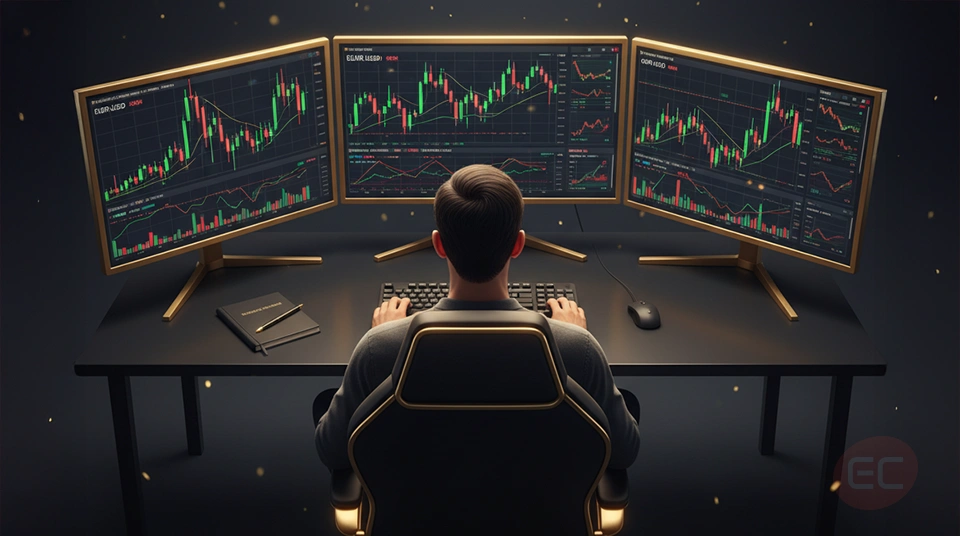Managing Emotions & Psychology of Trading
You’ve probably already heard the saying that trading is 90% mental, but what does that really mean? Most traders tend to start their journey focused on charts, setups, indicators, and strategies, but here’s the truth, without a strong understanding of the psychology of trading and knowing how to control trading psychology, none of that actually matters. Your emotions can really work against you, and they can sabotage your decisions before you even realise it, so knowing how to manage your emotions is crucial to your trading success. In this article, we are going to explore what the psychology of trading really means, why emotional control is critical for long-term success, the practical techniques to implement emotionless option trading and how to develop the right trading psychology to stayed disciplined and consistent.
Let’s get started!
- What is the Psychology of Trading?
- The Psychology of Trading - How it works
- How to control Trading Psychology
- The concept of Emotionless Option Trading
- Building a strong Trading Psychology through a routine based structure
- The most Common Mistakes that hurt your Trading Psychology
- Why the Psychology of Trading outweighs the Technical Skills
- Conclusion: Managing Emotions & Psychology of Trading
What is the Psychology of Trading?

Psychology of trading is a representation of the emotional and mental processes that affect how you make trading decisions in the market. Psychology of trading is what causes traders to abandon plans, chase price action, hold onto losers too long, or exit winners too early, so managing your trading psychology and learning how to control trading psychology is crucial to the success of your trades.
So whether you’re trading stocks, forex or options, trading psychology is most of the time the real reason why you either win or lose.
Ask yourself these questions, have you ever entered a trade too early because you didn’t want to miss out? Or maybe you exited too quickly because you were scared of losing profits? These are common emotions of poor trading psychology, and without the right system in place to recognize and address them effectively, even the most experienced and skilled traders can blow up their account. So take notes in this course, as this may be one of the most important skill sets you can learn as a beginner trader.
The Psychology of Trading - How it works
Just like any emotions, fear, greed, and frustration are typical human behaviours, they’re built into us, but, unlike life, they have no place in trading. When trading, you’re essentially operating in an environment where every single decision must be based on logic, probabilities, and discipline, no guess work, no emotions! Fear leads to hesitation, missed opportunities, and premature exits, all of which highlight the importance of understanding how to control trading psychology before entering any market. Greed, on the other hand, causes you to over-leverage or take low quality trades. Frustration can be the result of revenge trading, a situation where you're no longer making choices based on your strategy but instead, out of emotional reaction.
This is why so many traders promote the concept of emotionless option trading, because it doesn’t mean you don’t feel anything, it just means your actions are no longer dictated by what you feel, there is a clear and important difference between the two, one that we will dissect in this course.
How to control Trading Psychology
So, how do you actually begin to manage your mind and maintain focus under pressure when dealing with real money? It all starts with self-awareness and a solid structure. One of the most effective ways to develop emotional control when trading is by following a consistent, rule based approach. Following the rules you set out for yourself is daunting, but it can save you from making emotion based decisions that can seriously harm your trading account. Traders who succeed over the long term aren’t just emotionless robots, they’re disciplined traders who have built systems to keep their emotions in check, and most importantly, they are consistent with it.
One key strategy that works for many people is to use a trading journal. This journal can allow you to track your thought process, emotional state, and trade outcomes. So over time, you’ll notice specific patterns emerge and you might notice that you take lower quality trades after a loss, or that you exit too early after a big win out of the fear of giving profits back. This is a normal feeling, but this insight is critical when learning how to control trading psychology.
Another powerful tool that a lot of traders love to use is having a clearly written trading plan. Your plan should define when you enter a trade, when you exit a trade, and how much you’re willing to risk. It should be detailed enough and tested out enough that you don’t actually have to rely on your gut feeling. The term ‘your gut is always right’, when trading, well, it simply isn’t true. If you trade options for example, sticking to your plan can help build the foundation for consistent and emotionless trading.
The concept of Emotionless Option Trading
Preparing for uncertainty is an essential part of mastering how to control trading psychology and this is where emotionless option trading comes in. The markets are unpredictable and even the best setups can fail. When you anticipate that losses are part of the game, you remove the element of surprise and therefore it's easier to stay composed.
The main idea behind emotionless option trading is quite simple: it's the process of execution based on logic and rules, as opposed to emotion or impulse. True emotionless option trading is a discipline that separates consistent traders from reactive ones. This doesn't mean you ignore your feelings, you’re still a human behind your trading account, it just means that regardless of what you feel, whether it's nervousness, excitement, doubt, you still act in parallel with your trading plan.
In options trading leverage is higher and swings are sharper, so emotional discipline is absolutely important. The volatility can trigger such strong reactions, some that may even surprise you, but reacting emotionally to every price movement is a recipe for disaster and inconsistency. When you prepare your entry level, your stop loss and your take profit ahead of time. When you’re sticking to these levels regardless of your emotions, you're practicing true emotionless option trading.
Building a strong Trading Psychology through a routine based structure
Working on building a strong trading psychology is not a one off task, it's something you build through daily routines, consistent review, and honest self reflection. It takes time, but once you get it, you get it, and you can never go back. Start from the beginning of the day with your mornings, before the market opens, make sure to review your trading plan and remind yourself of the rules you’ve set out for yourself. Try not to actually open a chart until you’ve really grounded your mindset.
Once the market closes, then you should start reflecting on your performance. Did you follow your own rules? What was your emotional state during the trade? Were you stressed? Were you calm? These emotion reviews are the foundation for building a strong and lasting discipline, and understanding how to control trading psychology over a long time, no matter the situation.
Another critical strategy that should be implemented in your routine is stepping away from the screen. When you’re overtrading, it is often the result of mental fatigue or a desire to "make back" what you’ve lost in a quick way. The truth is that sometimes, the most disciplined thing you can actually do is simply walk away, give yourself some time to think and some time to breathe, then reevaluate.

The most Common Mistakes that hurt your Trading Psychology
Even the most experienced traders can fall into traps that can damage their mindset, some of the most common ones include:
- Trading without a plan
- Moving the stop loss levels impulsively
- Increasing position size after a specific loss
- Obsessing over one particularly bad trade
- Allowing one big win to inflate your confidence and your risk tolerance
Each of these mistakes can weaken your ability to stay disciplined and they can reduce your control over your emotional responses, so the longer you trade this way, the harder it becomes to maintain consistent and rational decisions.
Why the Psychology of Trading outweighs the Technical Skills
Many traders believe that they need to study more indicators or find the ‘perfect’ strategy. But the trust is, ask any professional trader where success really comes from, and the answer will usually be the same: psychology of trading.
Trading is not about being right all the time, it’s more about making the right decisions consistently, especially when things start getting hard. That’s when a trader really becomes a strong trader. You can have the best technical analysis, advanced strategies, and top notch trading tools, but if your trading psychology is poor, eventually, you'll override all of that once the stress starts kicking in. The market will test your patience, your discipline, and your mental resilience, and your results will reflect how prepared you are mentally, not just technically. So learning how to manage the psychology of trading and how to master emotionless option trading is absolutely crucial to the success of your trading journey!
Conclusion: Managing Emotions & Psychology of Trading
The longer you trade, the more and the quicker you’ll start to realize that it's not the market that beats you, it's your own mind. So mastering the psychology of trading means mastering yourself, your own mind.
Whether you're trading options, stocks, or forex, emotional control is what allows you to grow, it protects you from self destruction and it gives you the power to stay consistent. Once you master how to control trading psychology, you can essentially implement it in any aspect of your life. How to control trading psychology really creates the conditions for true progress.
So keep working on it and keep on refining your routines, recording your trades, and building self awareness. Try every day to get closer to true emotionless option trading, because when you master your emotions, you essentially master your edge.
We hope you enjoyed this course on managing emotions and the psychology of trading! If you’re ready to start learning more about trading then keep on reading the EC Markets Academy, we still have many trading topics, tips and tricks to get you from a beginner to a seasoned trader in no time! See you at the next course!